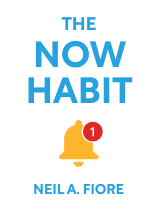

This article is an excerpt from the Shortform book guide to "The Now Habit" by Neil A. Fiore. Shortform has the world's best summaries and analyses of books you should be reading.
Like this article? Sign up for a free trial here.
Do your perfectionist tendencies cause you to procrastinate? How does perfectionism prevent you from getting things done?
Sometimes we procrastinate because we’re worried about what can go wrong with a task or project. This happens especially when we demand perfection from ourselves. But perfectionism only exacerbates procrastination by making you more stressed.
Here’s how perfectionism drives procrastination and what to do about it.
Done Is Better Than Perfect
Perfectionism is the most common reason we procrastinate: We set such high standards for ourselves and tell ourselves there will be dire consequences for not meeting those standards. As a result, we find it hard to even start working on something. If your goal is to be perfect, you’re all but guaranteed to fail—so why even put in the effort?
For example, a student might tell herself she has to get straight As or else she’s a failure who’ll never get a good job. Fiore points out that we often adopt these standards from others—parents, teachers, bosses, and so on.
Then, once we procrastinate, we typically feel bad and tell ourselves we’re lazy. That negative self-talk creates more anxiety, which in turn only makes it harder to get back to work by creating even more pressure.
Avoid Perfectionism by Emphasizing Starting Rather Than Finishing
Even once you have a detailed plan for tackling a major project, you might still find yourself procrastinating instead of doing the work. Fiore says this is another place where perfectionism gets in our way. He explains that we often focus too much on the end product—and because we want the finished product to be perfect, we never take the first steps of actually starting.
To counteract your perfectionism and procrastination tendencies, Fiore recommends you think of a project as a series of small starts. This advice works well with the previous suggestion to break down projects into their component tasks—instead of worrying about how you’ll finish all of your Christmas shopping, you can consult your list of small tasks and decide which one to start in your next 30-minute work session. (Shortform note: There’s value in getting started especially when you don’t feel like doing so or when you feel like you don’t know how to do something. As Mark Manson points out in The Subtle Art of Not Giving a F*ck, we often wait to be inspired to work on something when in reality, action leads to feeling inspired.)
Focusing on starting is also a psychological shift—it doesn’t literally mean that you always start something new and never come back to a partially completed task. The idea is that emphasizing starting instead of finishing removes the pressure to be perfect or to get things right the first time. Fiore warns that sometimes we think we’re working on a project when in fact we’ve fallen into a trap of never-ending research, preparation, and planning—past a certain point, he says, activities like these are just another form of procrastination.
(Shortform note: Starting sometimes means deliberately doing an imperfect job. For example, in Bird by Bird, writer Anne Lamott suggests beginning every writing project with a “sh**ty first draft”—just getting words down on the page without worrying about phrasing, typos, or even whether your ideas make any sense. The idea is to break through perfectionism with the knowledge that once you’ve made a first effort, you’ll have something you can later refine into a more polished product.)

———End of Preview———
Like what you just read? Read the rest of the world's best book summary and analysis of Neil A. Fiore's "The Now Habit" at Shortform.
Here's what you'll find in our full The Now Habit summary:
- Why people tend to put off the things that matter the most
- Where procrastination stems from, and why it doesn't mean you're lazy
- How to get more done while still maintaining a balanced life






